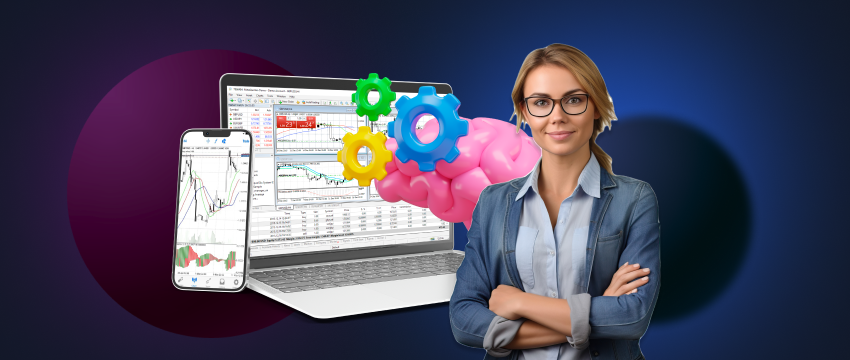A trader’s psychology is probably one of the most significant components of successful trading. This stands true for both professional and beginners traders. There are however psychological traits and behaviours that characterise successful traders, helping them to overcome mental roadblocks.
Successful traders are usually highly organised and have solid processes in place for analysing, executing, and monitoring trades. Traders are focused on their trading plan and don’t succumb to their emotions.
They abide by the parameters that they have set for themselves for opening and closing positions to mitigate risk. They lean into the methods that help them concentrate better, and follow the rules defined by their plan.

Successful trader characteristics
A successful trader doesn’t jump into trading decisions. He or she is not driven by implusion or because of a lack of patience. Instead, they use technical or fundamental analysis to decide how to execute trades, and view losses as something to learn. They are resilient and recover from poor trading outcomes, avoiding the feelings that lead to revenge trading.
Also a trader is someone who is a strong decision maker. They have realistic expectations about the potential for maximising profits. They display optimism but understand that consistency is generally more viable than running after high-risk returns. Also know their strengths and have identified their inherent flaws, playing on both in a way that can be meaningfully capitalised.
A good traders recognise their emotions but don’t let them steer financial decision making. They equip themselves with tools to manage psychology triggered by price fluctuations and use effective risk management to preserve capital.. They also know how to adapt to changing market conditions and don’t let fear impact trade execution.
A successful trader understands the importance of feeling like they are deserving of financial gains. They take the necessary steps to build confidence and spend time on daily retrospection to guide their future trading activities. They understand that trades won’t always succeed, develop a positive attitude toward failure, and take personal responsibility for adverse decisions.
Traders will always look for ways to build on their trading education. This learning comes from traditional resources, community forums, and monitoring economic releases and news to make informed, rather than emotional, financial decisions.

Developing an optimal trading psychology
Great traders spend time working on their trading psychology to increase the likelihood of successful financial outcomes. There use various techniques rooted in psychology to achieve a higher level of emotional resilience. Let’s explore some of these techniques:
Mindfulness and journalling
A successful trader will implement mindfulness practices to reduce the impact of emotional stress or reactions. This is to help them stay calm under pressure, and adopt a level-headed approach to trading situations. They will use a trading journal for historical reference to better understand why they executed specific trades and to garner crucial insights from their errors.
Learning and perspective
Successful traders actively pursue different perspectives and opposing viewpoints to achieve a balanced approach to trading decisions.
Additionally, they keep informed through ongoing learning by utilising educational tools and resources like podcasts, seminars, webinars, e-books, blogs, community forums, economic calendars, videos, and even demo trading accounts, etc.
Routines and a trading plan
A successful trader will seek to establish routines to reduce the uncertainty that comes with disorganised or erratic behavioural patterns and actions.
Developing a trading plan provides a framework for decisions, improves focus and discipline, and reduces emotional trades.
Time-out and rational decisions
Successful traders will make a concerted effort to reduce overwhelm by taking time away from their computer or mobile device. This helps reduce anxiety and stress, two strong emotions that often disrupt logical thought processes and hinder rational decision-making
Risk management and control
A successful trader will also make use of effective risk management tools like stop-loss orders to mitigate the risk of capital loss. This offers a better sense of control over their trades, thereby reducing feelings of fear or panic.
Brett Steenbarger, a renowned clinical psychologist, reinforces this in his blog on Overcoming Emotional Trading, stating that “setting stops is as much a psychological exercise as a risk management one.”
It is not enough simply to identify a price level for exit. This must be an emotional commitment. Mentally rehearsing scenarios where we’re stopped out—visualizing market action and our response—prepares us emotionally to handle the loss.
Overcoming cognitive bias of psychology
Finally, successful traders work to overcome cognitive bias, a key component of behavioral finance theory that influences trading choices and outcomes.Cognitive bias is essentially a flaw in the way that one reasons and generally stems from personal convictions. It greatly affects logical analysis and objective decision-making.

Key cognitive biases impacting trading
- Overconfidence bias
Overconfidence refers to one’s false sense of ability or skill. In other words, it occurs when a trader overestimates their ability to predict market direction and is common among traders of all levels.A successful trader exercises humbleness, remains unassuming, and recognizes that the market is so unpredictable that no one can predict its movement 100% of the time.
- Self-serving bias
This bias can come off as arrogance, as it refers to one attributing trading success to skill and failures to bad luck. A successful trader will instead recognise that regardless of their level of expertise, human error is inevitable. They acknowledge that adverse trading outcomes have more to do with limited knowledge, experience, or objective reasoning.
- Confirmation bias
Confirmation bias is the tendency for a trader to seek out data that confirms their pre-existing ideas or beliefs. They also ignore information that may challenge them. Confirmation bias in trading can be dangerous, so successful traders consider different viewpoints to make more balanced decisions.
Other types of cognitive biases include loss aversion, recency bias, anchoring bias, and hindsight bias.
Investing in practical learning to further boost your trading psychology
For someone new to trading, gaining the confidence needed to improve your psychology and become more successful is vital. One of the most practical ways to boost your confidence is by executing trades without the fear of losing your money.
This can be achieved by signing up for a demo trading aacount with T4Trade, a global award-winning broker that is gaining popularity due to its top-tier trading conditions, incredible selection of educational tools and resources, and a brilliant multilingual customer support team.
In addition to tight spreads, quick deposits/withdrawals, and fast trade execution, T4Trade offers flexible leverage and a variety of trading accounts tailored to today’s traders..
Using T4Trade’s demo trading account, you will learn more about how to execute trades on one of the world’s most popular and loved trading platforms, MetaTrader 4 (MT4). Using virtual funds, you’ll be able to open and close positions without the worry of losing your money. You’ll acquire the skills and expertise required to move to a live trading environment, accompanied by a more confident trading psychology to improve your chances of trading success.
إخلاء مسؤولية: This material is for general informational and educational purposes only and should not be considered investment advice or an investment recommendation. T4Trade is not responsible for any data provided by third parties referenced or hyperlinked in this communication.




